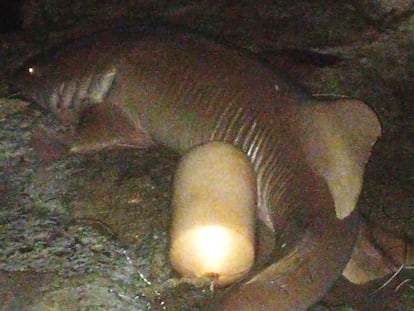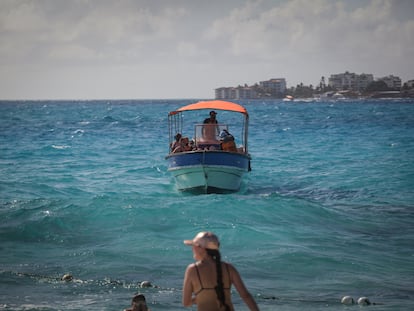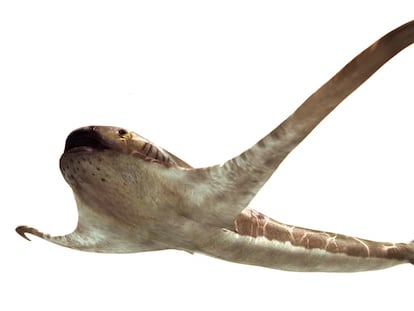Shark attack in Colombia: Locals organize hunt despite species’ protected status
Groups are trying to kill the specimen that mauled an Italian tourist, but environmental groups and local authorities warn such activities carry heavy penalties


The Colombian island of San Andrés, located in the Caribbean Sea, has been in shock since Friday, when an Italian tourist was killed after being bitten by a shark. The attack, which both experts and authorities argue was very unusual, has sparked a wide range of reactions. Some islanders are pressuring for action to find out who was to blame for the presence of the shark in a swimming area. Others have decided to take justice into their own hands and are organizing expeditions to hunt down and kill the animal – even though tiger sharks are a protected species in Colombia.
Hunting tiger sharks has been banned since 2008, and several animal rights organizations in San Andrés have come out to condemn the move to kill the animal. Corporación Raya, an animal welfare group, has denounced a video that shows a group of people trying to hunt sharks on the island’s beaches. In the footage, a navy ship approaches them, and an official is heard telling the group that they are in “waters in which the species they are trying to hunt is protected.” The locals reply: “The shark is going to kill us.”
They want sharks close to use them as entertainment, but when they get too close, they want to kill themJuliana Barberí, director of Corporación Raya
The hunting frenzy has already claimed its first victim: a nurse shark, which is a completely different species to the one that attacked the tourist on Friday. This animal was killed by the same group that appeared in the video. Experts from the environmental government body Coralina Corporation say that nurse sharks represent no danger to humans, adding that such actions carry with them strong sanctions. In Colombia, a person found guilty of illegal fishing or hunting can face fines of up to $916,500 and between 48 and 108 months in prison.
Meanwhile, local authorities have enlisted shark experts to help capture and relocate sharks to the distant Seaflower Biosphere Reserve. According to Coralina Corporation, this support team will use satellite technology to track the animals. To help the process, the environmental experts have called on the public not to throw away food into the sea, arguing that this can attract sharks, which typically inhabit deep waters, into shallower areas.
But this is not the only thing that must change, say activists. The Corporación Raya, which has been defending animal rights for 30 years, has also called on the tourist industry to stop feeding meat to sharks in an effort to lure them over so that visitors can take photos and videos with the animals.
According to specialists, this is a very common practice among the many diving clubs that have spread across the island, and which compete for customers. As a result, the sharks have become used to looking for food in areas they would naturally rule out, such as shallow waters where people go swimming.
Juliana Barberí, the director of Corporación Raya, says that she has received many complaints about the methods used by tourist outfits to secure shark sightings. “And now they are killing the sharks to protect their business, and in this way, stop tourists from getting scared about coming to this area of the island for their vacations,” she explains. “They want them close to use them as entertainment, but when they get too close, they want to kill them.”
Barbería is also critical of the government’s plan to relocate the sharks, arguing the sea is their home.
Tu suscripción se está usando en otro dispositivo
¿Quieres añadir otro usuario a tu suscripción?
Si continúas leyendo en este dispositivo, no se podrá leer en el otro.
FlechaTu suscripción se está usando en otro dispositivo y solo puedes acceder a EL PAÍS desde un dispositivo a la vez.
Si quieres compartir tu cuenta, cambia tu suscripción a la modalidad Premium, así podrás añadir otro usuario. Cada uno accederá con su propia cuenta de email, lo que os permitirá personalizar vuestra experiencia en EL PAÍS.
En el caso de no saber quién está usando tu cuenta, te recomendamos cambiar tu contraseña aquí.
Si decides continuar compartiendo tu cuenta, este mensaje se mostrará en tu dispositivo y en el de la otra persona que está usando tu cuenta de forma indefinida, afectando a tu experiencia de lectura. Puedes consultar aquí los términos y condiciones de la suscripción digital.









































